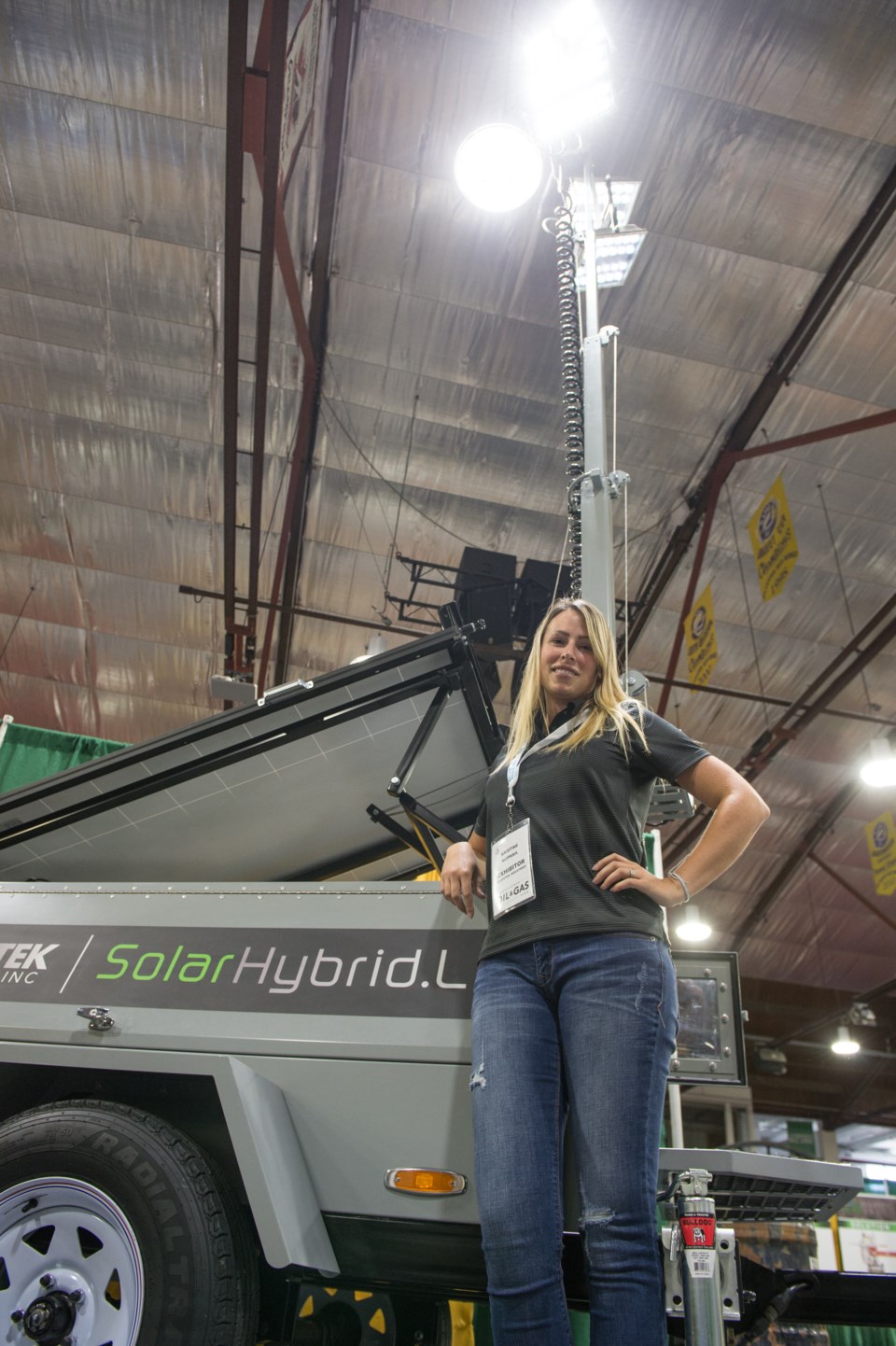Weyburn – What happens when you combine a solar-powered flashlight with a Prius hybrid car, build it into a trailer, and deploy it on a lease? Those concepts are clearly evident in one of the more curious exhibits at the Saskatchewan Oil and Gas Show in Weyburn June 7-8, in CLEANTEK Industries’ booth in the centre of Crescent Point Place.
The light tower sported solar panels, LED lights on the tower, and an engine. It quite literally is a solar powered light tower.
Kristine McPhail is the sales manager and director of marketing, but as a small company, she noted everyone wears a lot of hats. They are based at Balzac, just north of Calgary, behind the Crossiron Mills Mall.
“We started as Horizon Oilfield Solutions in 2009,” McPhail said. “We rebranded last year to CLEANTEK Industries to make our name more synonymous with what we do, especially since we branched outside of just oil and gas. With the downturn, we needed to find other ways to generate revenue that wasn’t tied to the drill bit, so we moved into construction, as well.”
“It has lithium-ion batteries, a 9 kilowatt Kubota generator, solar panels, and LED lights we make in-house,” she said. “This puts out twice the light of a standard metal-halide.”
The key is the large lithium ion battery pack in their newest generation of light towers, the SolarHybrid.Li. The original SolarHybrid used lead acid batteries.
Since lithium-ion batteries don’t work so well in -50 C weather, there’s metal plates between the batteries that keep it 20 C, all year round. “It’s completely climate controlled,” McPhail said. “We also have a fuel filter heater, to make sure it fires up reliably. One of the problems with standard light towers is at -30, -40, you just keep them running because you’re not sure if they’re going to start up. We had to make sure this will start up after being idle for six hours with the engine off. We kind of thought of everything.”
In the middle of the winter, in northern Saskatchewan or Alberta, there’s not a lot of solar power to be had, which is why, she said, solar light towers haven’t been as successful. “They can’t put out a lot of light, the light is dim, they don’t last for very long. That’s where we had to supplement with the generator. In the summer, you’re going to get a lot more solar power. If you took this to California, you’d get tons of solar power. But up here, you’re not getting a lot, so it’s mostly the intelligent control system in the unit that turns the generator on when the battery gets low.”
It’s got plug-ins, too.
“For the first time ever, in a light tower, you can power auxiliary equipment without the generator turning on,” she added. “They call it solar priority. If there’s one single drop of solar power available, it’s going out the receptacles.”
In southeast Saskatchewan, in the summer time, the generator has to run for one 45-minute period to charge the batteries enough to run the lights a whole night. “The solar’s going to go into it during the day. The lights will go on around 9. Probably around 2, 3 o’clock in the morning, the generator’s going to kick on for 45 minutes to top up the batteries, and turn off. It likely won’t turn back on, unless you’re drawing intense auxiliary power, for the rest of the night.”
McPhail said, “It’s the only light tower that has a DC gen set in it, so we are able to put the energy into the batteries and pull directly from the batteries, rather than having to pull it from the generator.”
There’s 44 units out there. “As fast as we can manufacture them, they’re going out to work,” She said.
The original unit came out in 2012. The took 18 months of the downturn to rework the unit into the second generation, the lithium-ion unit. The first lithium-ion units came off the line in late 2016.
“Because the engine is only going to run 500 hours a year, you don’t even have to change the oil every year. You only have to change the oil every 750 hours,” according to McPhail, adding one should still change the oil to match the season.
A standard light tower might run 4,000 to 5,000 hours a year. “We’re about 10 per cent of that,” she said of the generator motor.
McPhail said the fuel savings is “massive, almost 17,000 litres of fuel savings a year.” In addition to that is the labour cost – having someone go out and fueling the unit consistently.
The tower is powered for deployment. “I did it in 120 seconds, in heels,” McPhail said.
“We manage our whole fleet in Western Canada. We track these via GPS, so most times, we know if there’s something wrong before our customers do. Our field technician comes out here once a month and manages the towers. We deliver them ourselves.”
They’re in the process of developing a local presence in Saskatchewan.
“Anything with solar panels on it, the optics of it is amazing. People like being green,” McPhail said. “If you give them green options that saves them money, and its green, and it save them operational time – if we can do that, and they’re saving money, it’s almost a no-brainer.”



